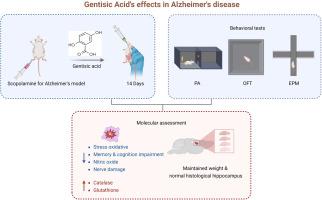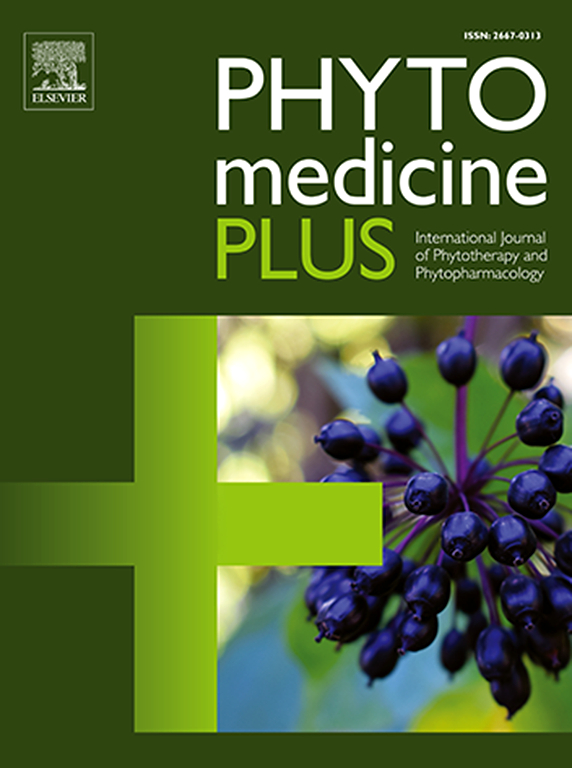龙胆酸对东莨菪碱诱导的雄性小鼠阿尔茨海默病的保护作用评价
Q3 Pharmacology, Toxicology and Pharmaceutics
引用次数: 0
摘要
阿尔茨海默病(AD)对行为反应和抗氧化状态有不利影响,由于其抗氧化特性,使用遗传酸(GA)可能有助于减轻这些不利影响。我们评估了GA对小鼠行为和抗氧化反应的影响。方法将36只雄性NMRI小鼠分为6组(n = 6),分别为对照组、东莨菪碱(SC; 1 mg/kg)、利瓦斯汀(Riv; 2.5 mg/kg)和不同剂量的GA(112.5、225、450 mg/kg)。口服治疗,连续14天。行为学测试包括被动回避测试(PAT)、升高加迷宫测试(EPM)和开放场测试(OFT)。最后,收集血液和组织样本以评估抗氧化剂的变化,并进行组织病理学分析。结果ga能显著改善小鼠记忆和认知障碍,预防神经损伤,维持小鼠体重,维持海马正常组织学特征(P < 0.05)。此外,GA增加血清过氧化氢酶(CAT)和谷胱甘肽(GSH)水平,同时降低一氧化氮(NO)水平。高剂量GA (450 mg/kg)治疗效果最佳。结论aga具有抗氧化作用,可用于治疗AD。尽管如此,还需要进一步的研究来确定这种化合物抗阿尔茨海默氏症的确切机制。这项研究是在老鼠身上进行的,结果不能推广到人类身上。本文章由计算机程序翻译,如有差异,请以英文原文为准。

Assessment of Gentisic acid's protective effects on scopolamine-induced Alzheimer’s disease in male mice
Introduction
Alzheimer’s disease (AD) has detrimental effects on behavioral responses and antioxidant status, and the use of gentisic acid (GA) may help alleviate these adverse effects due to its antioxidant properties. We evaluated the impact of GA on behavioral and antioxidant responses in mice.
Methods
In this experimental-laboratory study, 36 male NMRI mice were allocated to 6 groups (n = 6), including control groups, scopolamine (SC; 1 mg/kg), rivastigmine (Riv; 2.5 mg/kg), and different doses of GA (112.5, 225, and 450 mg/kg). The therapies were administered orally for 14 continuous days. Behavioral tests, including the passive avoidance test (PAT), the elevated plus maze test (EPM), and the open-field test (OFT), were conducted. Finally, blood and tissue samples were collected to evaluate the changes in antioxidants, and histopathological analysis was performed sequentially.
Results
GA could significantly improve memory and cognitive disorders, prevent nerve damage, and maintain the weight of the mice, as well as the normal histological characteristics of the hippocampus (P < 0.05). Additionally, GA increased serum levels of catalase (CAT) and glutathione (GSH) while decreasing nitric oxide (NO) levels. The high dose of GA (450 mg/kg) exhibited the maximum therapeutic effect.
Conclusion
GA may be useful in the treatment of AD due to its antioxidant effects. Nonetheless, further research is needed to determine the exact anti-Alzheimer's mechanism of this compound. This study was conducted on mice, and the results cannot be generalized to humans.
求助全文
通过发布文献求助,成功后即可免费获取论文全文。
去求助
来源期刊

Phytomedicine Plus
Medicine-Complementary and Alternative Medicine
CiteScore
3.70
自引率
0.00%
发文量
178
审稿时长
81 days
期刊介绍:
 求助内容:
求助内容: 应助结果提醒方式:
应助结果提醒方式:


